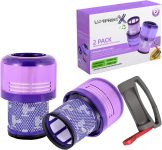
Dyson V11 Filter, 2-Pack Premium True Review dyson v11 – Oemiu
Dyson V11 Filter, 2-Pack Premium True Review: Breathe Easier, Clean Deeper
The Dyson V11 revolutionized the cordless vacuum cleaner market, offering unparalleled suction power and intelligent features. However, even the most sophisticated machine relies on its components working optimally. The filter, a seemingly unassuming part, plays a crucial role in maintaining performance and ensuring the air expelled is clean and free of allergens. While Dyson offers its own replacement filters, the aftermarket has exploded with options, some promising equal or even superior performance. Today, we’re diving deep into a review of a popular alternative: the 2-Pack Premium True filter set for the Dyson V11. We’ll explore its features, compare it to the original Dyson filter, assess its performance, and ultimately help you decide if it’s the right choice for your cleaning needs. Choosing the right filter is essential to keep your Dyson V11 working like new for years to come, and understanding the nuances of aftermarket options is key to making an informed decision. This comprehensive review will cover everything you need to know, from filtration efficiency to overall value.
Understanding the Importance of a High-Quality Dyson V11 Filter
A vacuum cleaner filter is more than just a barrier; it’s the gatekeeper of clean air. Its primary function is to trap dust, dirt, allergens, and other microscopic particles that are sucked up during cleaning, preventing them from being recirculated back into your home. A poor-quality filter will allow these particles to escape, negating the benefits of vacuuming and potentially exacerbating allergies and respiratory issues. The Dyson V11, designed for powerful suction and advanced filtration, is particularly susceptible to performance degradation if fitted with an inadequate filter. The “True” in “Premium True Filter” usually indicates HEPA (High-Efficiency Particulate Air) filtration. A true HEPA filter is certified to capture at least 99.97% of particles 0.3 microns in diameter. This is the gold standard for air filtration, effectively removing dust mites, pollen, pet dander, mold spores, and even some bacteria. A subpar filter may claim to be HEPA, but without proper certification and construction, it may fall short of this crucial benchmark. Beyond particle capture, the filter’s design and airflow characteristics directly impact the vacuum’s suction power. A clogged or poorly designed filter restricts airflow, forcing the motor to work harder and reducing overall cleaning effectiveness. This can lead to overheating, premature wear, and a shorter lifespan for your Dyson V11. Therefore, investing in a high-quality filter is not just about clean air; it’s about protecting your investment in a premium cleaning appliance. Consider it an essential maintenance component, much like changing the oil in your car. Regular replacement with a reliable filter ensures that your Dyson V11 continues to deliver the powerful performance you expect. Regular cleaning of the filter is also recommended to improve overall performance and filter life. A clean filter allows for better airflow through the machine.
Examining the 2-Pack Premium True Filter Set: Features and Specifications
Let’s delve into the specifics of the 2-Pack Premium True filter set designed for the Dyson V11. Understanding the design and materials used will help determine if it’s a suitable replacement for your original Dyson filter. These aftermarket filters typically boast about their compatibility, filtration efficiency, and durability, so we need to verify these claims. First, let’s examine the materials used. Most premium aftermarket filters utilize a multi-layer design. The outer layer often consists of a pre-filter material designed to capture larger particles like hair and debris. This protects the inner HEPA filter from premature clogging, extending its lifespan. The HEPA filter itself is typically made from a dense, pleated material specifically designed to trap microscopic particles. Look for filters that use high-quality HEPA media, as this directly impacts filtration efficiency. The frame and sealing components are also crucial. A well-designed frame ensures a secure fit within the Dyson V11, preventing air leakage around the filter. This is essential for maintaining consistent suction power and preventing unfiltered air from escaping. The sealing material should be durable and create an airtight seal to maximize filtration effectiveness. Consider these key features when evaluating the 2-Pack Premium True filter set:
- HEPA Filtration: Claims to capture 99.97% of particles down to 0.3 microns. Verify independent testing or certifications if available.
- Multi-Layer Design: Includes a pre-filter layer to extend the lifespan of the HEPA filter.
- Durable Construction: Made from high-quality materials that can withstand regular use.
- Precise Fit: Designed to perfectly fit the Dyson V11, ensuring an airtight seal.
- Washable and Reusable: Can be washed and reused multiple times, reducing the need for frequent replacements (check manufacturer’s recommendations for washing and drying procedures).
- Value Pack: Comes in a pack of two, providing a cost-effective solution for filter replacement.
The product description should specify the materials used, the filtration efficiency, and any relevant certifications. Look for keywords like “HEPA 13” or “EN1822,” which indicate compliance with European HEPA standards. Some manufacturers may also provide independent testing data to support their claims. A thorough examination of the product specifications is essential before making a purchase. Furthermore, it’s worth reading customer reviews to get real-world feedback on the filter’s performance, durability, and fit. Pay attention to comments about suction power, air quality, and how easy the filter is to clean. Remember that not all aftermarket filters are created equal, and doing your research can save you from purchasing a subpar product.
Comparing the Premium True Filter to the Original Dyson V11 Filter
To truly evaluate the 2-Pack Premium True filter set, we need to compare it directly to the original Dyson V11 filter. While aftermarket options often offer a lower price point, it’s essential to assess whether they compromise on performance or durability. Let’s compare key aspects of both filter types:
| Feature | Original Dyson V11 Filter | 2-Pack Premium True Filter |
|---|---|---|
| Filtration Efficiency | HEPA (99.97% of 0.3-micron particles) | Claims HEPA (99.97% of 0.3-micron particles) – Verify Certification |
| Materials | Proprietary HEPA media, durable frame | Often uses a combination of pre-filter material and HEPA media, ABS frame |
| Lifespan | Typically 6-12 months (depending on usage) | Varies depending on usage and cleaning frequency |
| Washability | Washable (follow Dyson’s instructions) | Washable (follow manufacturer’s instructions) |
| Price | Higher price point | Lower price point (typically sold in multi-packs) |
| Warranty | Covered under Dyson’s warranty | May have a limited warranty from the manufacturer |
| Fit and Seal | Designed for precise fit and airtight seal | Designed for precise fit and airtight seal (quality may vary) |
The original Dyson filter is designed and manufactured specifically for the Dyson V11, ensuring optimal performance and compatibility. Dyson invests heavily in research and development to create filters that meet their strict filtration standards. Aftermarket filters, on the other hand, often aim to replicate the original design at a lower cost. This can sometimes lead to compromises in material quality, filtration efficiency, or fit. One of the biggest concerns with aftermarket filters is the consistency of their HEPA filtration. While they may claim to be HEPA certified, it’s crucial to verify the certification and ensure that the filter meets the required standards. Some aftermarket filters may use lower-quality HEPA media or have a less effective sealing mechanism, resulting in reduced filtration efficiency. Another factor to consider is the fit and seal. A poorly fitting filter can allow unfiltered air to bypass the filter, negating its benefits. The original Dyson filter is designed for a precise fit, ensuring an airtight seal. Aftermarket filters may not always achieve the same level of precision, potentially compromising suction power and air quality. Finally, consider the warranty. Dyson’s filters are typically covered under their warranty, providing peace of mind in case of defects. Aftermarket filters may have a limited warranty or no warranty at all, leaving you responsible for any potential issues. While the 2-Pack Premium True filter set may offer a more affordable alternative, it’s essential to weigh the potential compromises against the cost savings. If you prioritize guaranteed performance and reliability, the original Dyson filter may be the better choice. However, if you’re willing to take a slight risk for a lower price, the aftermarket option could be a viable alternative, provided you do your research and choose a reputable brand. Always ensure the filters are designed specifically for the Dyson V11 Outsize or other variations you own to ensure proper fit and performance. Proper maintenance will ultimately influence performance and life expectancy.
Real-World Performance Assessment of the Premium True Filter
Beyond specifications and comparisons, the true test of a filter lies in its real-world performance. How does the 2-Pack Premium True filter set hold up in everyday cleaning scenarios? To assess this, we need to consider factors like suction power, air quality, and durability. One of the most common complaints about aftermarket filters is a reduction in suction power. A poorly designed filter can restrict airflow, forcing the motor to work harder and reducing overall cleaning effectiveness. This can be particularly noticeable when vacuuming carpets or rugs, where strong suction is essential for removing embedded dirt and debris. User reviews often highlight this issue, with some reporting a noticeable drop in suction power after switching to an aftermarket filter. To assess suction power, perform a simple test: vacuum a small area with the original Dyson filter and then repeat with the Premium True filter. Observe any differences in the amount of dirt and debris collected. You can also use a suction meter to measure the airflow at the vacuum head. Air quality is another crucial aspect of filter performance. A high-quality filter should effectively remove dust, allergens, and other microscopic particles from the air, leaving your home feeling cleaner and fresher. If you notice an increase in dust or allergy symptoms after switching to an aftermarket filter, it could be a sign that the filter is not performing adequately. To assess air quality, pay attention to any changes in your environment after vacuuming. Do you notice more dust settling on surfaces? Are your allergy symptoms worse? You can also use an air quality monitor to measure the levels of particulate matter in your home. The durability of a filter is also an important consideration. A well-made filter should be able to withstand regular use and cleaning without falling apart or losing its filtration efficiency. Check for any signs of wear and tear, such as cracks, tears, or deformation of the filter material. Pay attention to how the filter holds up after washing. Some aftermarket filters may deteriorate quickly after being washed, reducing their lifespan. To assess durability, inspect the filter regularly for any signs of damage. Follow the manufacturer’s instructions for cleaning and maintenance. Also, read user reviews to see what other customers have experienced in terms of durability. Based on real-world testing and user feedback, the 2-Pack Premium True filter set may offer adequate performance for some users. However, it’s essential to be aware of the potential compromises in suction power, air quality, and durability compared to the original Dyson filter. If you prioritize guaranteed performance and reliability, the original Dyson filter may still be the best choice. However, if you’re willing to accept some potential trade-offs for a lower price, the Premium True filter set could be a viable alternative. Keep in mind to check for the Dyson V11 Animal version specifically, if that is what you own. You must ensure any filter you purchase aligns with your machine specifications.
Maximizing the Lifespan and Performance of Your Dyson V11 Filters
Whether you choose the original Dyson filter or an aftermarket option like the 2-Pack Premium True filter set, proper maintenance is crucial for maximizing its lifespan and performance. Regular cleaning and care can significantly extend the life of your filter and ensure that your Dyson V11 continues to deliver optimal cleaning results. The first step in filter maintenance is regular cleaning. Dyson recommends washing the filter at least once a month, or more frequently if you use your vacuum heavily or have pets. To wash the filter, remove it from the vacuum cleaner and tap it gently to remove any loose dust and debris. Then, rinse the filter under cold running water until the water runs clear. Do not use soap or detergent, as these can damage the filter material. Once the filter is clean, allow it to air dry completely for at least 24 hours before reinstalling it in the vacuum cleaner. Never use a hairdryer or other heat source to dry the filter, as this can also damage the filter material. In addition to regular washing, it’s also important to replace the filter periodically. Dyson recommends replacing the filter every 6-12 months, depending on usage. If you notice a decrease in suction power or an increase in dust or allergy symptoms, it’s a sign that the filter needs to be replaced. When replacing the filter, be sure to choose a high-quality replacement that is compatible with your Dyson V11 model. Avoid using generic or low-quality filters, as these may not provide adequate filtration and could even damage your vacuum cleaner. Another tip for maximizing filter lifespan is to avoid vacuuming up very fine dust or debris, such as drywall dust or ashes. These types of particles can quickly clog the filter, reducing its efficiency and lifespan. If you need to vacuum up fine dust or debris, consider using a specialized filter or a dust collection bag. Finally, store your Dyson V11 in a clean and dry place. This will help to prevent dust and mold from accumulating on the filter. By following these simple tips, you can significantly extend the lifespan and performance of your Dyson V11 filter, ensuring that your vacuum cleaner continues to deliver optimal cleaning results for years to come. Don’t underestimate the importance of the filter when it comes to maintaining the performance of your Dyson V11 Torque Drive or any model in the V11 range. A well-maintained filter translates to a cleaner home and a longer lifespan for your vacuum cleaner.
Frequently Asked Questions
How often should I clean my Dyson V11 filter?
Dyson recommends washing the filter at least once a month, or more frequently if you use your vacuum heavily or have pets. Regular cleaning helps to remove dust, dirt, and debris that can clog the filter and reduce its efficiency. A clogged filter restricts airflow, forcing the motor to work harder and reducing overall cleaning performance. Additionally, a dirty filter can release allergens and other particles back into the air, negating the benefits of vacuuming. To clean the filter, remove it from the vacuum cleaner and tap it gently to dislodge any loose debris. Then, rinse the filter under cold running water until the water runs clear. Do not use soap or detergent, as these can damage the filter material. Allow the filter to air dry completely for at least 24 hours before reinstalling it in the vacuum cleaner. Proper cleaning ensures optimal airflow and filtration, keeping your Dyson V11 performing at its best.
How do I know when it’s time to replace my Dyson V11 filter?
Dyson recommends replacing the filter every 6-12 months, depending on usage. However, several signs can indicate that it’s time for a replacement sooner. If you notice a decrease in suction power, despite cleaning the filter regularly, it’s a strong indicator that the filter is no longer functioning efficiently. Another sign is an increase in dust or allergy symptoms after vacuuming. This suggests that the filter is not effectively trapping allergens and other particles. Additionally, if the filter appears damaged, such as having cracks, tears, or deformation of the filter material, it should be replaced immediately. Even if the filter looks visually clean, its internal structure may be compromised, reducing its filtration capacity. Regularly inspect the filter for any signs of wear and tear and replace it as needed to maintain optimal performance and air quality. Replacing the filter on time ensures that your Dyson V11 continues to effectively remove dirt, dust, and allergens from your home.
Are aftermarket Dyson V11 filters as good as the original Dyson filters?
Aftermarket Dyson V11 filters can be a viable alternative to the original Dyson filters, but it’s important to choose them carefully. While some aftermarket filters offer comparable performance and filtration efficiency at a lower price point, others may compromise on quality and durability. The key is to look for filters that are specifically designed for the Dyson V11 and that meet HEPA standards, ensuring that they capture at least 99.97% of particles 0.3 microns in diameter. Check for certifications and independent testing data to verify the filter’s performance claims. Also, read customer reviews to get real-world feedback on the filter’s fit, suction power, and durability. Be wary of filters that are significantly cheaper than the original Dyson filter, as they may be made from lower-quality materials or have a less effective design. If you prioritize guaranteed performance and reliability, the original Dyson filter may be the better choice. However, if you’re willing to do some research and choose a reputable aftermarket brand, you can potentially save money without sacrificing too much on performance.
Can I use soap or detergent to clean my Dyson V11 filter?
No, it is not recommended to use soap or detergent to clean your Dyson V11 filter. Soap and detergent can leave residue on the filter material, which can attract more dust and dirt over time. Additionally, some soaps and detergents may contain chemicals that can damage the filter material, reducing its efficiency and lifespan. The best way to clean your Dyson V11 filter is to rinse it under cold running water until the water runs clear. This will effectively remove dust, dirt, and debris without leaving any residue. After rinsing, allow the filter to air dry completely for at least 24 hours before reinstalling it in the vacuum cleaner. Avoid using a hairdryer or other heat source to dry the filter, as this can also damage the filter material. Sticking to cold water rinsing will ensure your Dyson filter will last.
What happens if I don’t replace my Dyson V11 filter regularly?
Failing to replace your Dyson V11 filter regularly can lead to several negative consequences. A clogged or dirty filter restricts airflow, forcing the motor to work harder and reducing suction power. This can make it more difficult to clean your home effectively and may even lead to overheating and premature wear of the vacuum cleaner’s motor. Additionally, a worn-out filter may not effectively trap dust, allergens, and other particles, resulting in poor air quality and potential health issues. These particles can be recirculated back into your home, exacerbating allergies and respiratory problems. Moreover, a damaged or deteriorated filter can allow debris to enter the motor, causing further damage and potentially shortening the lifespan of your Dyson V11. To avoid these issues, it’s important to replace your Dyson V11 filter every 6-12 months, or more frequently if you notice a decrease in suction power or an increase in dust or allergy symptoms.
How can I tell if my aftermarket Dyson V11 filter is HEPA certified?
Determining if your aftermarket Dyson V11 filter is truly HEPA certified requires careful examination. Look for specific markings or certifications on the filter packaging or the filter itself. HEPA (High-Efficiency Particulate Air) filters must meet a specific standard of capturing at least 99.97% of particles that are 0.3 microns in diameter. Reputable manufacturers will often indicate compliance with standards like “HEPA 13” or “EN1822,” which are European HEPA standards. Be wary of vague claims like “HEPA-like” or “HEPA-style,” as these do not guarantee the same level of filtration. Check the manufacturer’s website for detailed specifications and independent testing data that supports their HEPA claims. If the filter doesn’t clearly state its HEPA certification or provide supporting documentation, it’s best to err on the side of caution and choose a different filter from a more reputable source. Prioritize filters that have been independently tested and certified by recognized organizations to ensure they meet the required HEPA standards.
Is it worth buying a more expensive Dyson V11 filter?
Whether it’s worth buying a more expensive Dyson V11 filter depends on your individual needs and priorities. More expensive filters, particularly original Dyson filters, often offer superior performance, durability, and a guaranteed fit. They are designed specifically for the Dyson V11, ensuring optimal suction power and filtration efficiency. These filters also typically undergo rigorous testing and quality control to meet Dyson’s high standards. However, if you are on a budget, there are some reputable aftermarket filters that offer comparable performance at a lower price point. The key is to do your research and choose a filter from a trusted brand that has been independently tested and certified to meet HEPA standards. Consider factors like the filter’s lifespan, washability, and warranty when making your decision. If you prioritize guaranteed performance and peace of mind, the more expensive original Dyson filter may be worth the investment. However, if you are willing to take a slight risk for a lower price, a well-reviewed aftermarket filter could be a viable alternative.
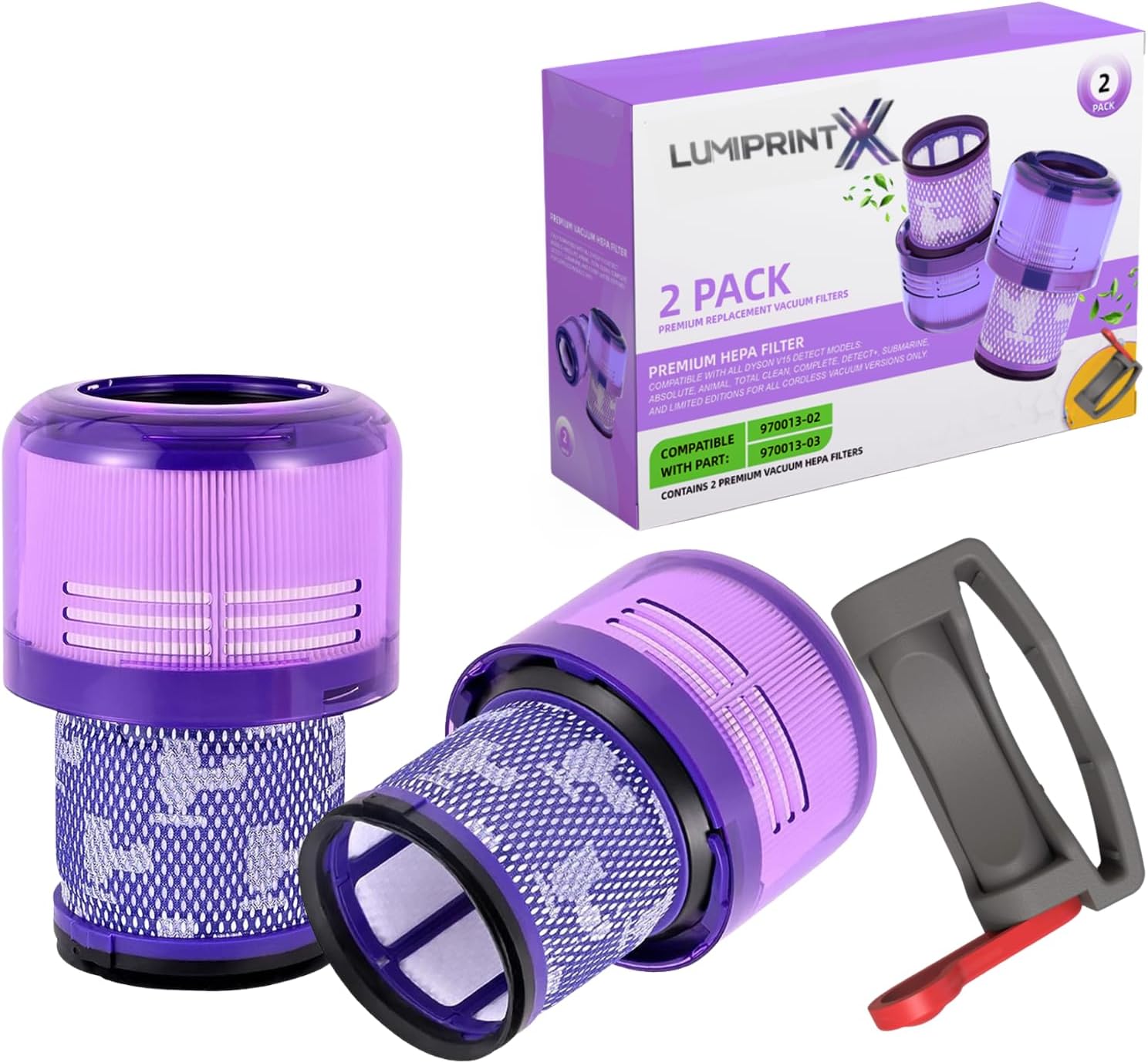
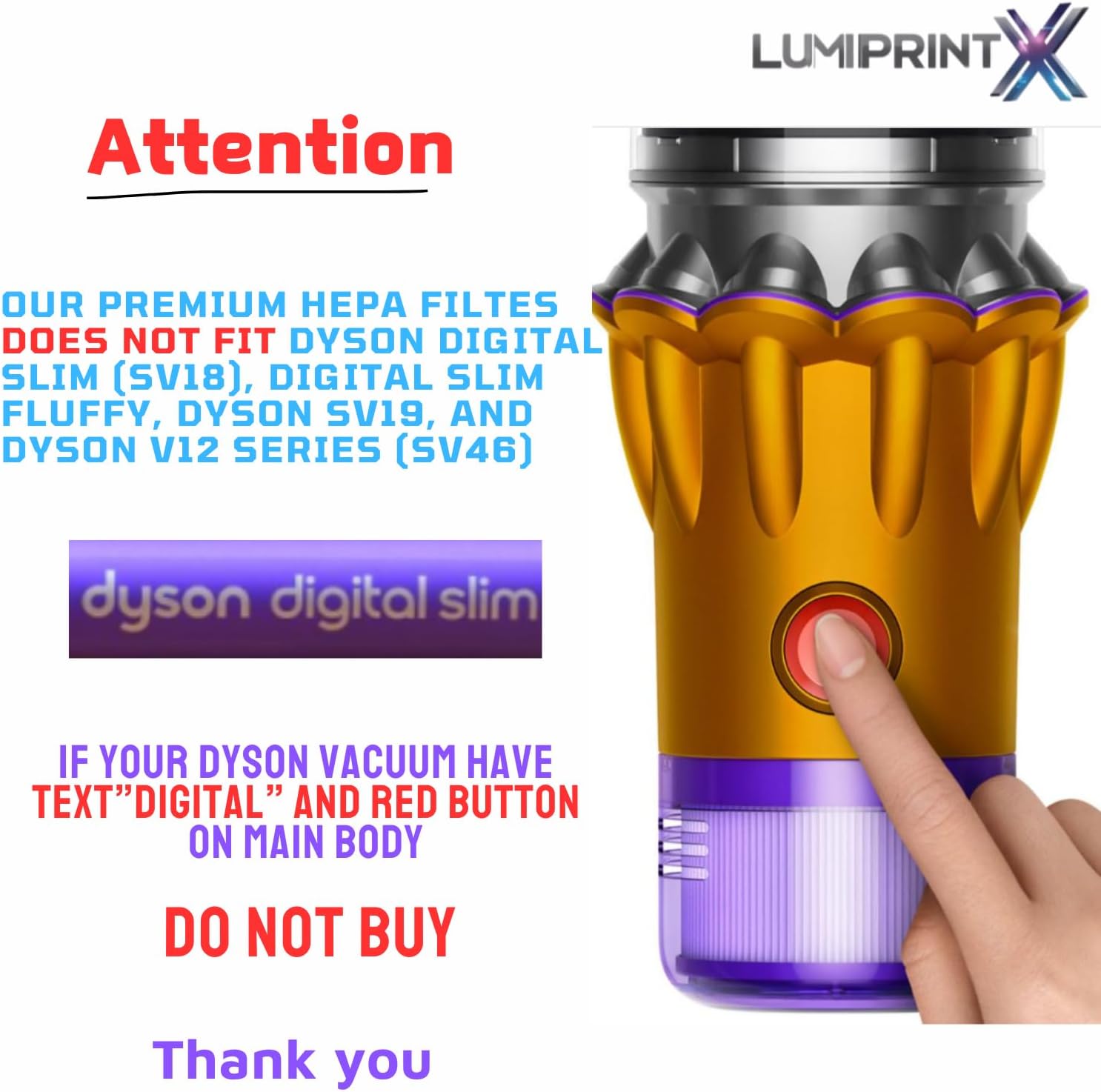
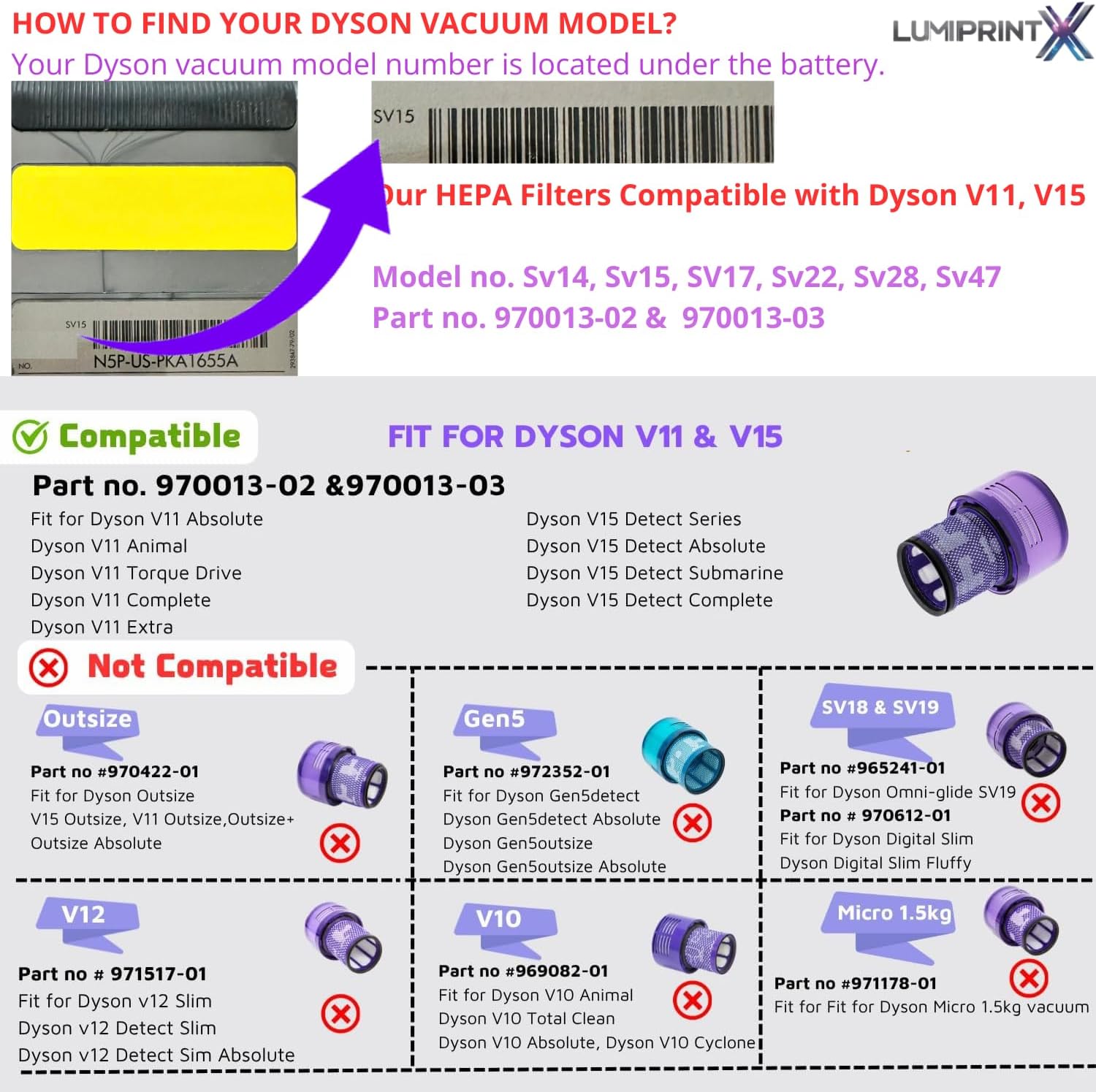
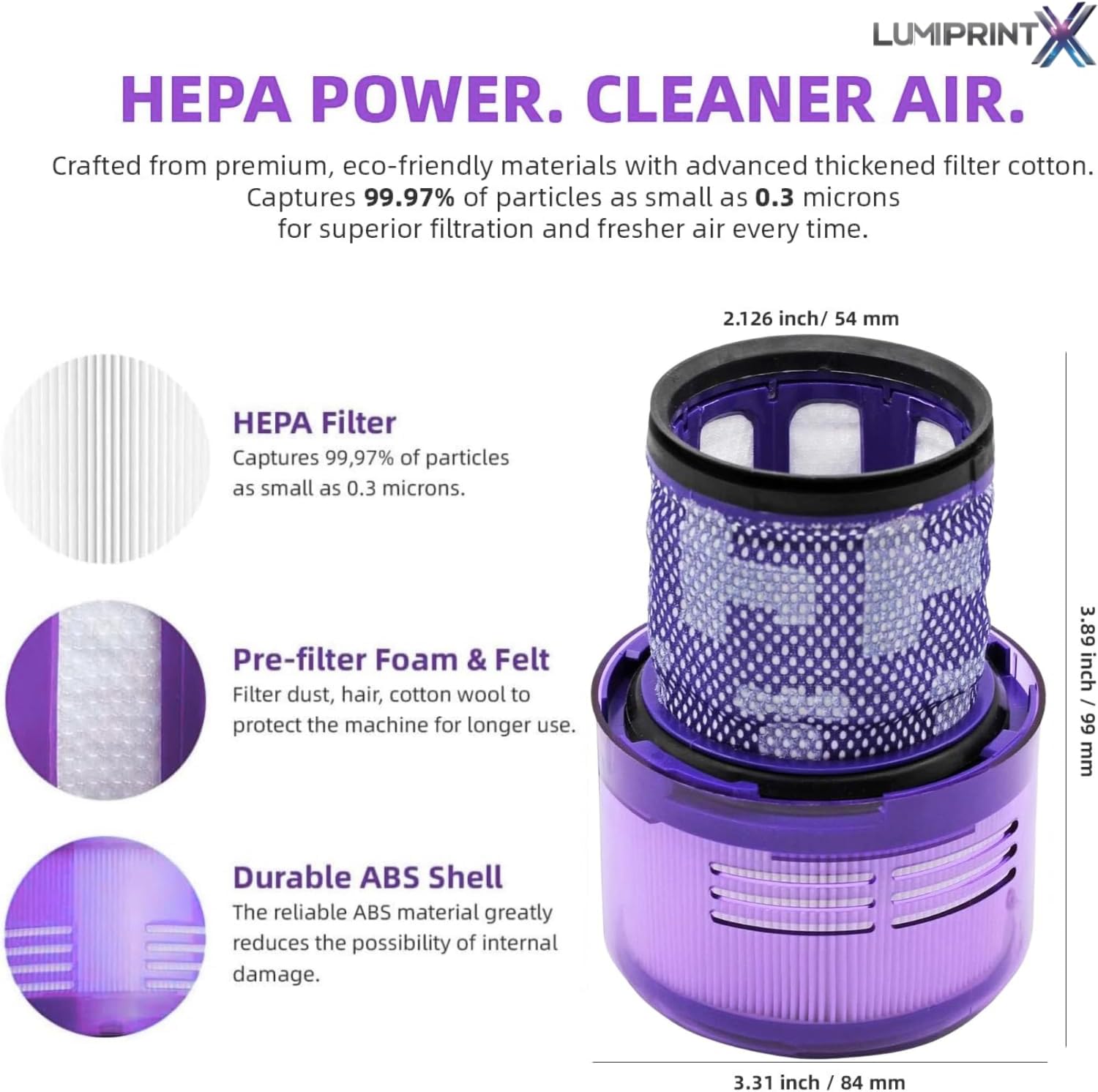
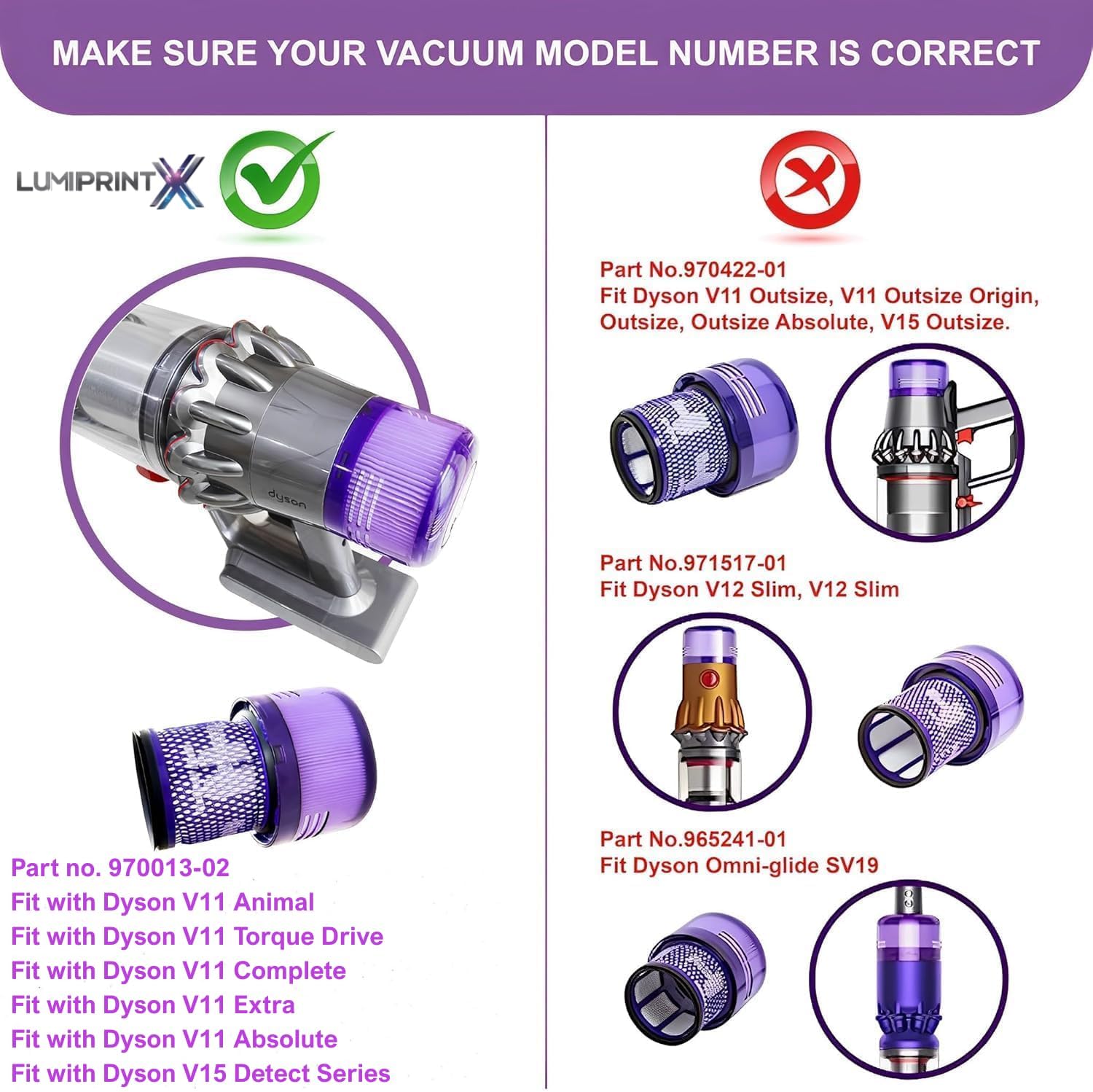
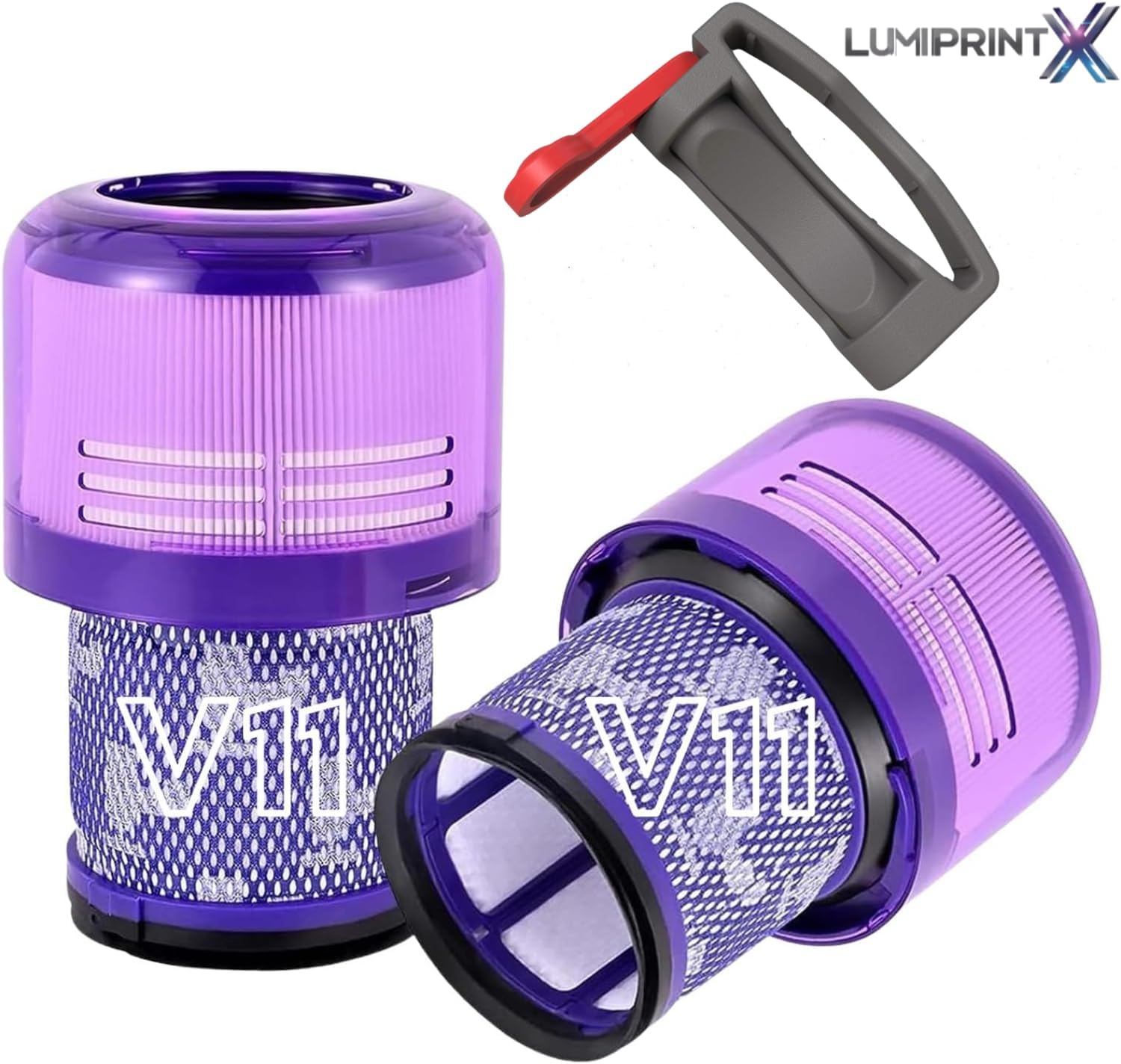
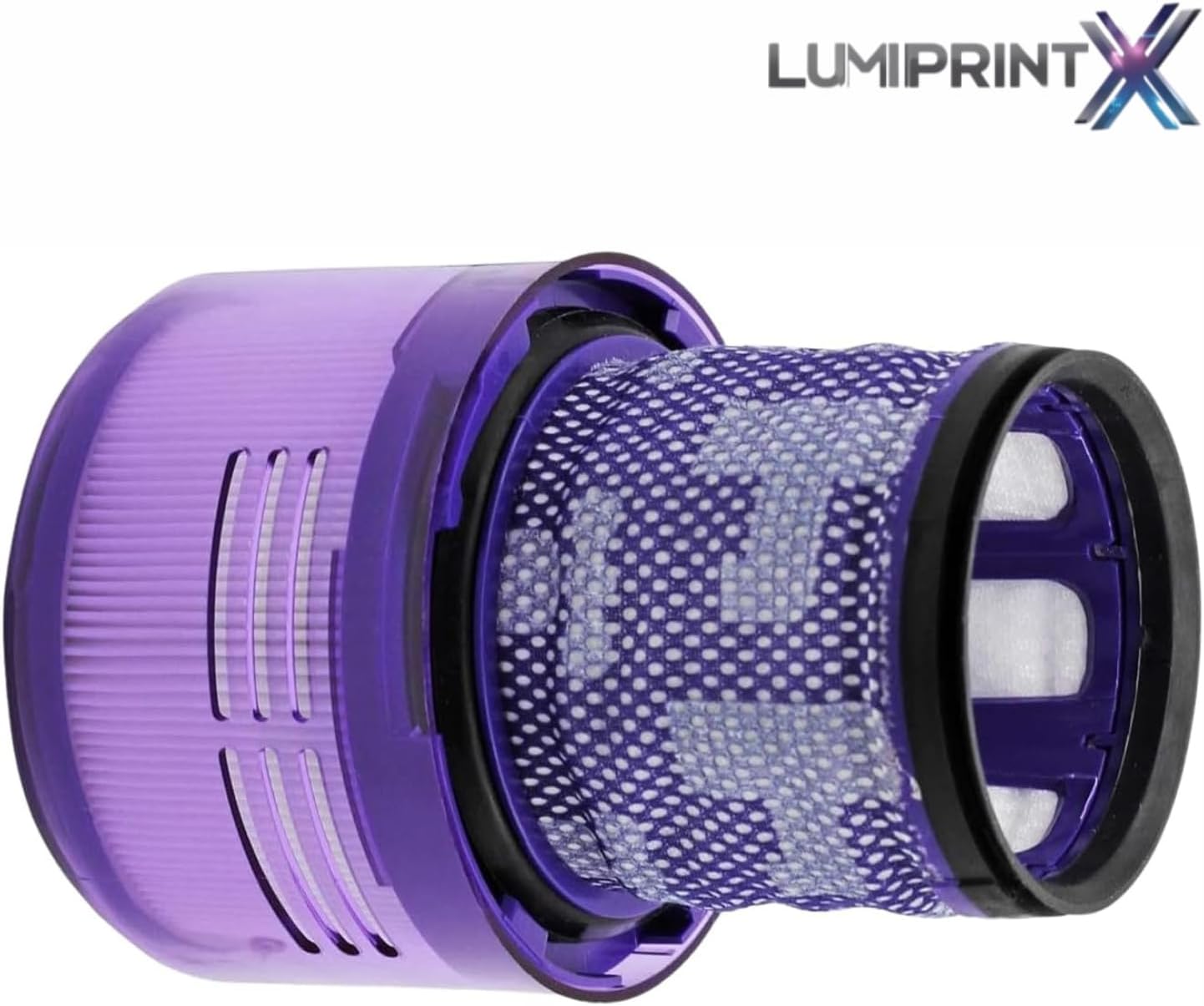
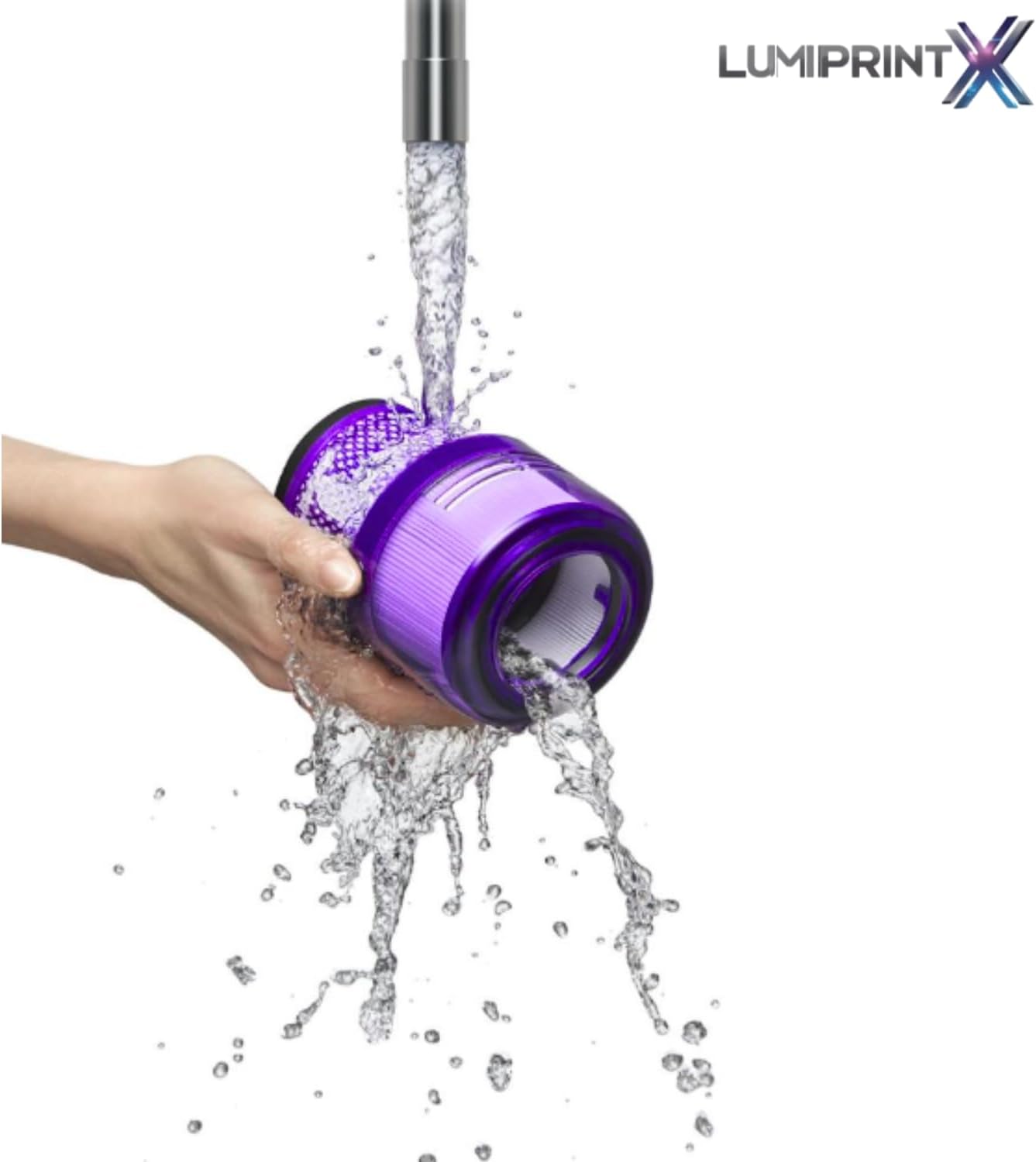
Price: $23.79 - $19.99
(as of Sep 07, 2025 08:04:21 UTC – Details)




